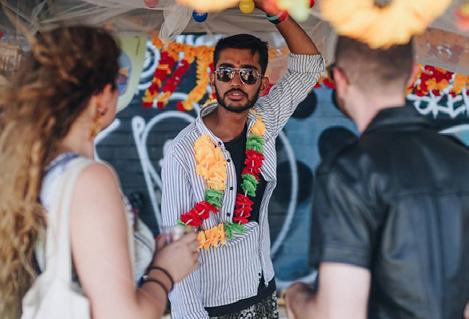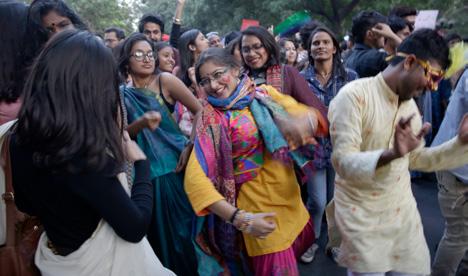
6 minute read
For culture, for queer
from 2018-10 Brisbane
by Indian Link
SIDDHARTH SHARMA on being openly gay in the South Asian community
Unlike most young Indians, for me, coming out to my parents was no big deal. Yes, there were issues, but nothing compared to what many others faced. I’m glad for India’s decision to once and for all decriminalise homosexuality not because I have a personal agenda, but because it will allow millions of Indians to finally live and love with dignity and openness.

I have always been confident about both, being Indian and being gay, but it bothered me that hardly anyone spoke specifically about being gay in the South Asian community here, which is how FOBGAYS+ (Friends and Family of Brown Gays, Lesbian, Queer, Transgender, Axesual and Intersex+ people) came about.
The way that most other LGBTIQ+ organisations work is in a bit more of an Anglo-Saxon context, and tend to focus on the individual’s rights. There’s more focus on protesting and campaigning. Activism obviously needs to be active, but it doesn’t need to be harmful and it doesn’t need to be aggressive.
And in our South Asian community, shouting doesn’t work. What works is slowly introducing people to things in a way that celebrates cultural context: casual chats over chai.
And so, that’s what FOBGAYS+ tries to do: break the cycle of misunderstanding, fear and intolerance. I worked with my cousin Giti and brother Siddhant to create the organisation, and the reactions I got from people were mixed. Some people were very nonchalant about it. Other people were awkward. Someone told my parents to go take a parenting class, saying, ‘Don’t worry, we can fix this’.
But it wasn’t the only challenge. There’s a lot of racial discrimination within the gay community and South Asians tend to sit at the bottom of the pyramid in terms of perceived attractiveness. So we’re trying to flip that discrimination based on race and show that we’re proud of our culture.
I want to send a message to the wider queer community: we are here, we are
South Asian and we are part of this movement. And it’s also a message to the South Asian community: yes, we do support queer people, but we also support our culture.
To that end, my team and I decided to use symbols that would resonate with everyone. We’ve used colours that are reminiscent of Indian streetscapes. The elephant is a symbol of being proud. And the The Golden Girls, for its theme song ‘Thank You For Being A Friend’ - it was perfect for what we were trying to do.
We’ve only just started to reach out to the Islamic community, talking to people who are both Muslim and pro-gay rights. One person was Greens MP Dr Mehreen Faruqi, an active Muslim who spoke out in support of the Same-Sex Marriage Bill in Australia.
I think it’s imperative for people to tell their stories. For any cause, you need to have people with their own experiences to come out and be willing to share. And unless a story is told in a particular language, it doesn’t exist in that language. It’s been so important in communicating the experience of queerness in a way that is relatable and accessible to the Hindispeaking community.
I faced a series of questions, mostly along the lines of “Why are you moving when you can make impact in India?” My answers would be bland — “to learn skills from a different country” or “the course in Australia is better than that in India”.
Let’s just say these answers were mostly true. What I didn’t tell people is that I wanted to move away from my loved ones to a place where I could stop hiding my identity and live a normal life, even if for a few years. Now that I think about it, I couldn’t agree more when petitioners from IIT told the Supreme Court that the mere existence of Section 377 is causing young Indians to leave their home country and settle abroad.
The court’s decision is a huge step in that direction and the judgement will give people courage to speak up. It’s a huge opportunity to create a solid foundation for equality. The pride parades, which have been going on for a few years, are getting bigger every time. When you have more groups and people marching for action and calling attention to an issue, you create a little bit more pressure on the government to do something. And it puts the wheels in motion for our culture to start talking about this kind of thing. As told to Stephanie Newman my friends — all of whom were nothing but supportive. I’ve been lucky to be in a family where my parents have never questioned or rejected my queer identity. They’re taking their time to understand me, and I’m glad that they’re part of this journey.
“History owes an apology to the members of LGBTQ+ community and their families…” When Supreme Court Judge Indu Malhotra said this in her judgement while decriminalising homosexuality, I knew that a new chapter in my life had just begun. Her statement reminded me of the millions of gay men and women in our country who have suffered mental, emotional and physical abuse for just being their true self. I agree that this apology has been delayed by almost a century: will it right all the wrongs? No. But is it welcome? Certainly. When news broke that the Supreme Court of India was ready to present its statement on the constitutional validity of Section 377, I was confident that this time India would be on the right side of history. It made a mistake once in 2013. It would not repeat it. This time, during all the hearings it was heartening to see that the court was sympathetic to the LGBTQ+ community. Following the verdict, rainbow colours took over my social media feed. Our moment had finally arrived. Or had it? I began thinking: how will this change my life? I call myself an activist. For the last two years, I’ve been working in India around issues of climate change and human rights. I was proud of my work, and so were my friends and family.
So when I decided to uproot my life and move to Australia for further studies,
Every LGBTQ+ person in India wants to live a simple truth: a life where they are not fighting anyone anymore. I’m blessed that I have the privilege to make such a move, but not everyone can do this.
Most people in India do not understand what decriminalisation really means. Many say that Section 377 has hardly imprisoned anyone in India for consensual gay sex. While this may be true, most don’t understand that it’s not the law that the LGBTQ+ members fear, it’s the society. And to get over this fear, we needed to first let go of Section 377.
Since the time I knew I was gay, I’ve been living in fear. How would people react if they knew? Would I get beaten up? Will my friends stop talking to me? My poor teenage self could barely survive this trauma, but thankfully I got past it. For the last few years, I’ve begun to trust people, and have started to come out to
I’ve been extremely lucky to also find a partner who treats me respectfully. I’ve been with this person for the past two years. But being a gay couple in India is not easy. My partner and I lived together in India for two years. In front of our friends, we could be like every other couple. But in public, we had to be different people. For the outside world, we were friends, colleagues, and sometimes even siblings. You see, the fear of society had the power to change the face of love.
It has been two months since I’ve been in Australia. And I’m slowly getting comfortable with the idea of being my true self. I still remember the feeling of holding my partner’s hand at the airport. It felt natural… but also surreal. Moments such as these is what India’s gay community is hoping for. They may seem small, inconsequential and even run-of-the-mill to other folks, but for us, it’s a huge victory.
Now that Section 377 has been scrapped in India, am I ready to come out of the closet completely? Well, I’m not sure. Society has been cruel to us, and many will still continue to fight for equal rights. A change in the law is the first big step, but we have to clear many more hurdles before we finally proclaim that we’ve arrived. Here’s hoping.
*Name changed on request







